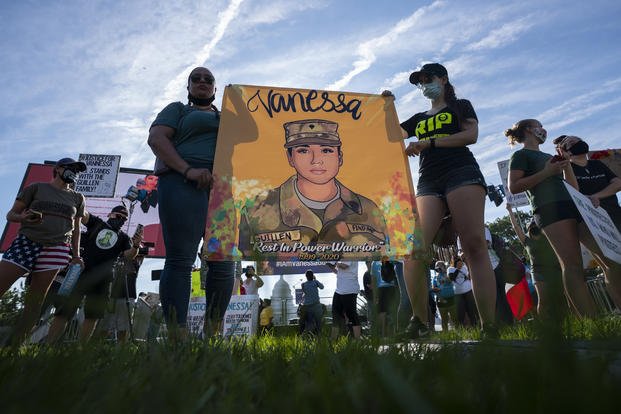The Army announced Wednesday that it is launching a one-year pilot program establishing resource centers for victims of sexual assault and harassment.
The program aims to centralize a variety of resources for victims, including legal support, investigations and medical services. Previously, victims of sexual harassment or assault have often faced a labyrinth of military bureaucracy to access basic services or start an investigation, a process usually kicked off by a meeting with their chain of command.
"The intent is we bring together a host of services in a centralized location so it's much more responsive for victims," Col. Kelly Webster, deputy director of the Army's People First Task Force, told reporters Wednesday.
The centers still would report to the senior leadership of that installation, but could give a victim means to maneuver around their immediate chain of command, which can include the perpetrator or supervisors who may want to protect the perpetrator.
"It doesn't eliminate, but reduces the likelihood of any retaliation," Webster said.
Read Next: 2 Soldiers Die at Fort Bragg on the Same Day in Unrelated Incidents
However, the Army idea is not new.
There have been sexual assault resource centers in the past, some of which still exist. This pilot is effectively a sequel to a 2014 program that established victim centers, but they were largely starved of resources and never became commonplace on bases.
"In some places, this already exists, but they didn't look like what we're envisioning for this pilot," said Col. Erica Cameron, the lead on the Army's redesigned sexual assault prevention program. "There's additional personnel. In many cases, they didn't have direct support."
Army documents provided to Military.com noted some of the motivation for the new centers were delays in services for victims, slow responsiveness of services, and poor communication of resources for victims.
For active-duty soldiers, the program will be tested at Aberdeen Proving Ground, Maryland; Schofield Barracks, Hawaii; Fort Bragg, North Carolina; Fort Irwin, California; Fort Riley, Kansas; and Fort Sill, Oklahoma.
The Army Reserve will have a small pilot program in the 99th Readiness Division headquarted at Joint Base McGuire-Dix-Lakehurst, New Jersey. The National Guard will not be involved in the pilot program due to the 50 states and four territories all having their own rules, as well as Guardsmen having a mishmash of different types of state and federal orders that can confuse policy.
The pilot program is one of the Army's first big shifts to address sexual assault and harassment a year and a half after the brutal slaying of Spc. Vanessa Guillén.
Guillen was bludgeoned to death with a hammer by Spc. Aaron Robinson, who later killed himself when law enforcement was closing in to take him into custody. While investigators never concluded whether Robinson harassed her, Guillén previously reported being sexuallay harassed by another soldier -- twice -- but her leadership never took action.
Her murder was a flashpoint across the entire Defense Department and Congress, triggering a reckoning on the failure of military leaders to protect the rank and file.
The unresolved issued of sexual assault and harassment in the force culminated in a damning Fort Hood, Texas, investigation in December that unveiled systemic leadership failures responsible for an environment where it was permissible to harass and assault soldiers, mostly women.
In a letter to the force Wednesday signed by Army Secretary Christine Wormuth, Army Chief of Staff James McConville and Sergeant Major of the Army Michael Grinston, the trio acknowledged that "structural changes" are needed to revamp the force's sexual assault prevention policies in light of Guillén's death and that they need feedback from soldiers on the pilot program.
"Over the past year and a half, our Army embarked on an unprecedented review of how we care for people," the trio said in a statement. "Our Army needs your help and support as we test this new approach to improving our response and support to victims."
Women remain an extreme minority in the Army, making up only 16% of the force. Sexual assault and harassment festered within the rank and file for decades, with little evidence that leaders have put a dent in the issue.
This year, under pressure from Congress, Defense Secretary Lloyd Austin ordered an independent review of how sexual assaults are handled and in June accepted all its reform recommendations, including removing commanders from decisions over sexual assault prosecutions.
However, the Pentagon in September said it will be 2027 before its first tranche of military-wide sexual assault reforms can be implemented.
"The DoD efforts in this space will be the largest ever attempted. No university, no major institution is at our scale," Deputy Defense Secretary Kathleen Hicks said. "We want to move fast, but we want to make sure these changes last and we build back that trust."
Reports of sexual assault in the military marginally increased in 2020, a year in which most troops were largely in lockdown amid the COVID-19 pandemic. Annual data released by the Pentagon shows that assaults involving troops went up 1% compared to 2019.
According to the report, there were 7,816 reported sexual assaults.
-- Steve Beynon can be reached at Steve.Beynon@military.com. Follow him on Twitter @StevenBeynon.
Related: Pentagon's First Wave of Sexual Assault Reforms Will Take 6 Years to Complete












